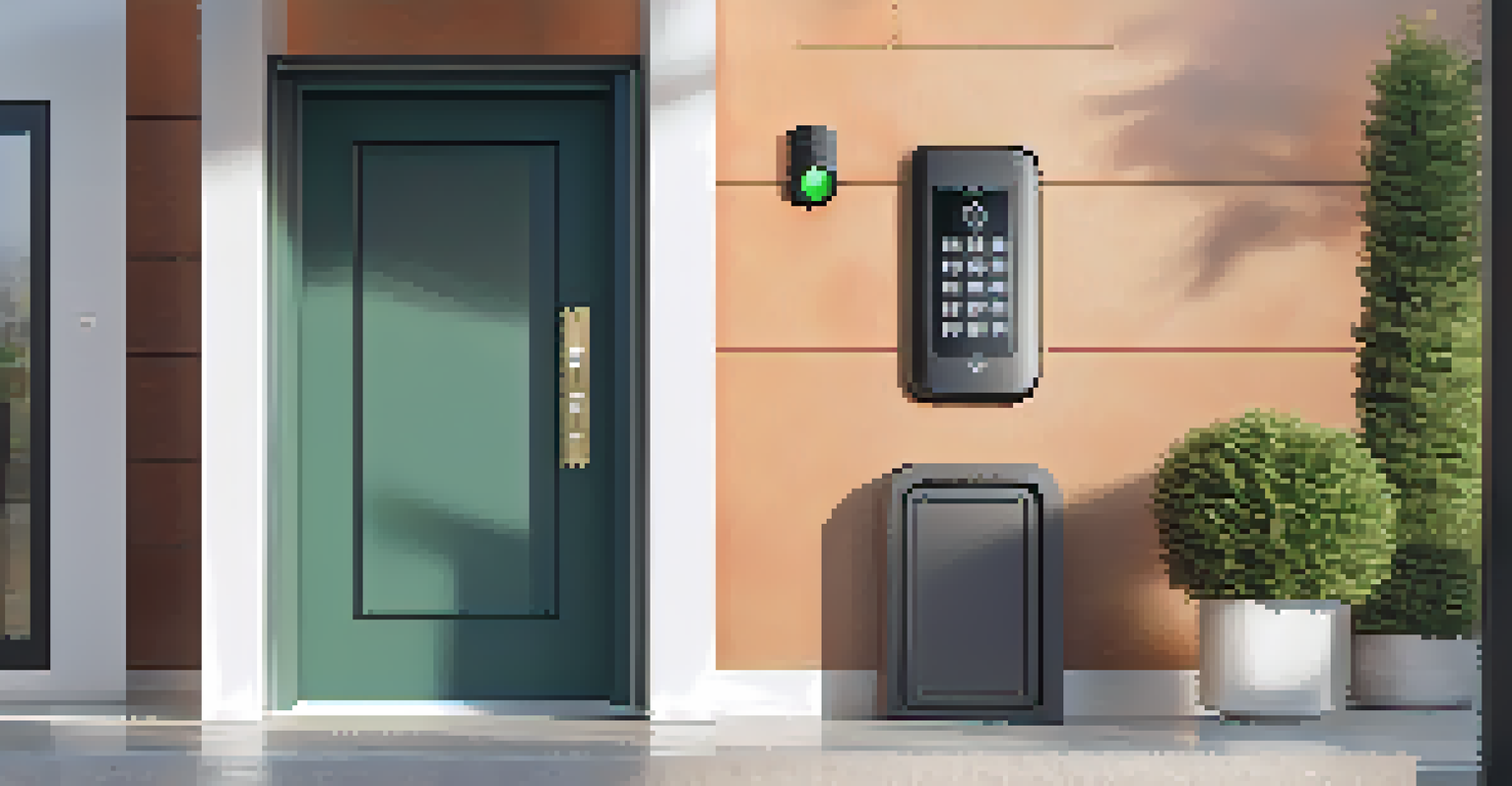Understanding Different Types of Home Security Systems

What Are Home Security Systems and Why They Matter
Home security systems are designed to protect your property and loved ones from intruders and other potential threats. They range from simple locks and alarms to advanced surveillance systems that monitor your home 24/7. Understanding these systems is essential in choosing the right one for your needs, as security is a top priority for many homeowners.
The safety of the people shall be the highest law.
The importance of home security cannot be overstated. According to studies, homes without security systems are up to three times more likely to be burglarized. Knowing that your home is equipped with the right security measures can give you peace of mind, allowing you to focus on enjoying your life rather than worrying about potential dangers.
As we dive into the different types of home security systems, keep in mind that the right choice ultimately depends on your unique situation. Factors such as your budget, the size of your home, and your personal preferences will all play a role in determining the best system for you.
Wired Security Systems: Reliability and Consistency
Wired security systems are often considered a traditional choice, connecting various components through physical wires. These systems are generally known for their reliability, as they are less susceptible to interference from wireless signals. Homeowners who prioritize a stable connection may find wired systems appealing, especially in areas with poor wireless reception.

One of the key benefits of wired systems is their consistent performance. Once installed, they typically require less maintenance and are less likely to suffer from connectivity issues compared to their wireless counterparts. This makes them an excellent option for those who want a set-it-and-forget-it approach to home security.
Importance of Home Security Systems
Home security systems are essential for protecting your property and loved ones from intruders, significantly reducing the likelihood of burglary.
However, installation can be a downside for some, as wired systems may require significant modifications to your home's infrastructure. This can lead to higher initial costs and greater disruption during installation. Nonetheless, for those who value reliability, wired systems remain a popular choice.
Wireless Security Systems: Flexibility and Ease of Use
Wireless security systems have gained popularity due to their ease of installation and flexibility. These systems use radio signals to communicate, which means homeowners can install and configure them without the need for extensive wiring. This is particularly beneficial for renters or those who may want to relocate their systems in the future.
Security is not a product, but a process.
Another advantage of wireless systems is their scalability. Homeowners can easily add or remove components, such as cameras or sensors, to adapt to changing security needs. This flexibility allows you to customize your system according to the layout of your home and your specific security concerns.
However, it's important to note that wireless systems can be vulnerable to interference from other devices or environmental factors. Security measures such as encryption and regular software updates can help mitigate these risks, ensuring your system remains reliable. Overall, wireless security systems offer a modern and user-friendly alternative to traditional options.
Monitored vs. Unmonitored Security Systems
When choosing a home security system, you'll encounter two main types: monitored and unmonitored systems. Monitored systems come with a professional service that keeps an eye on your home around the clock. If an alarm is triggered, the monitoring center will contact you and the authorities, ensuring a quick response to potential threats.
On the other hand, unmonitored systems rely on the homeowner to respond to alarms. These systems may alert you through loud sirens or notifications, but the responsibility for contacting authorities falls on you. While unmonitored systems are generally more affordable, they may not provide the same level of protection as monitored options.
Types of Security Systems Explained
Understanding the differences between wired, wireless, monitored, and smart systems helps homeowners choose the best security solution for their unique needs.
Ultimately, your choice should reflect your lifestyle and comfort level. If you're often away from home or prefer peace of mind knowing someone is watching over your property, a monitored system may be worth the investment. Conversely, if you’re budget-conscious and can respond quickly to alerts, an unmonitored system could suit your needs.
Smart Home Security Systems: The Future of Safety
Smart home security systems integrate technology to provide enhanced security features and convenience. These systems can be controlled through smartphones or tablets, allowing homeowners to monitor their property from anywhere. Features like remote access, automated alerts, and integration with other smart devices make these systems highly appealing.
One of the standout benefits of smart security systems is their ability to provide real-time updates. For instance, you can receive notifications on your phone if a door is opened or if motion is detected, giving you peace of mind when you're away. Additionally, many smart systems allow for video surveillance, letting you check in on your home at any time.
However, with the convenience of smart systems comes the need for robust cybersecurity measures. Homeowners must ensure their devices are secure to prevent unauthorized access. Despite this, the growing trend towards smart home technology shows that these systems are becoming a vital part of modern home security.
Camera Systems: Eyes on Your Property
Camera systems are a crucial component of many home security setups, offering visual monitoring of your property. From indoor cameras that keep an eye on your kids or pets to outdoor cameras that capture any suspicious activity, these devices provide an additional layer of security. Many modern camera systems come equipped with features like motion detection and night vision to enhance their effectiveness.
One of the key advantages of camera systems is their deterrent effect. Just the presence of cameras can discourage potential burglars from targeting your home. Additionally, having recorded footage can be invaluable if a crime does occur, providing evidence that can aid law enforcement.
Choosing the Right System
Selecting the appropriate home security system involves assessing your specific needs, budget, and preferences to ensure optimal protection.
When choosing a camera system, consider factors like resolution, field of view, and connectivity. Some cameras can even integrate with smart home systems, allowing for seamless control and monitoring. Overall, camera systems are an excellent way to keep a close watch on your property.
Alarm Systems: The First Line of Defense
Alarm systems are often the first line of defense in home security, designed to alert homeowners and authorities to potential intrusions. These systems can include door and window sensors, motion detectors, and sirens that trigger when unauthorized entry is detected. An effective alarm system can act as a deterrent, discouraging intruders from attempting to break in.
Many modern alarm systems offer features such as smartphone alerts and integration with other security devices. This means you can receive instant notifications if your alarm goes off, no matter where you are. Some systems also allow you to remotely arm or disarm your alarm, adding to their convenience and effectiveness.

While alarm systems can vary in complexity and cost, investing in a reliable system is crucial. Whether you opt for a simple DIY setup or a professionally installed system, having an alarm can significantly enhance your home security and provide peace of mind.
Choosing the Right Home Security System for You
With so many options available, selecting the right home security system can feel overwhelming. Start by assessing your specific needs, such as the size of your home, your budget, and how much you value convenience versus reliability. By understanding your priorities, you can narrow down your choices and find the system that best fits your lifestyle.
Consider consulting with professionals who can provide insights based on your unique situation. They can help you understand the strengths and weaknesses of different systems and recommend the best solution for your needs. Remember, investing in quality security is an investment in your peace of mind.
Once you've chosen a system, take the time to properly install and maintain it. Regular checks and updates will ensure your home remains secure, allowing you to enjoy your space without worry. Ultimately, the right home security system will safeguard your loved ones and provide a sense of safety and comfort.